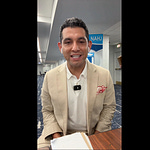Rocky Hernandez fought for the United States in Vietnam. Decades later, the country he served deported him—leaving him on the streets of Tijuana at 2 a.m. Today, in Mexico Hernandez leads a support center for deported veterans, surrounded by thousands of files detailing stories like his own.
TIJUANA, MEXICO — When you walk into the office of U.S. Deported Veterans, one of the first things you see isn’t its director Rocky Hernandez—it’s the massive steel filing cabinet next to him. Nearly every drawer is stuffed with folders, thousands of them, each one representing a deported U.S. military veteran.
Hernandez, a Vietnam War veteran, spends his days beside the files, each one proof that he’s not alone–but also a stark record of how the United States discards some of its soldiers.
“Every one of these is a soldier,” Hernandez says thumbing through the files. “They fought for the U.S., and now they’re here, like me.”
A Soldier Turned Exile
Hernandez fought in Vietnam but has spent the last nine years in Tijuana, deported during President Donald Trump’s first term. He admits he was the kind of immigrant Trump vowed to remove.
“I got in trouble,” Hernandez says. “I was the kind of guy he was talking about.”
When he was deported, Hernandez was dropped in Tijuana at 2 a.m., unable to speak Spanish and stripped of his cash.
“I started walking around, didn’t know where I was,” he recalls. “A guy who was on his way to work on the other side of the border asked me what I was doing. I told him, ‘I just got deported. I’m a veteran. I served the United States Army. And here I am.’”
The stranger paid for his cab fare, which dropped him at a shelter. Hernandez spent his first week sleeping on a cot in the director’s office, gathering the will to start over.
“I had to start all over. But I’m a soldier. Soldiers don’t give up.”
A Life Rebuilt, Piece by Piece
Now in his late 60s, Hernandez has rebuilt a life for himself. He learned Spanish on the job, rented a small apartment with help from locals, and earns about $2,000 a month between his U.S. military pension and his role as director of a support center for deported U.S. veterans.
“I still get paid from the U.S. military,” he says. “They pay me for my service, even though they deported me. I can’t go back to pick it up, so a friend brings me my money.”
Listen to this episode with a 7-day free trial
Subscribe to Nick Valencia Live to listen to this post and get 7 days of free access to the full post archives.










